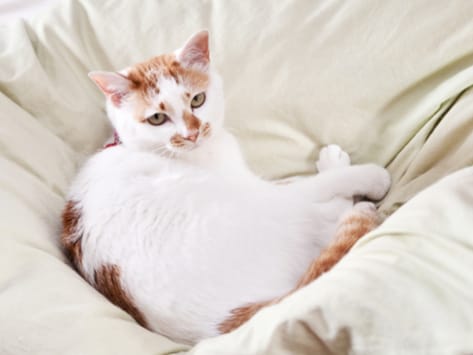Another easy way to increase your cat s water intake is to switch him from kibble to a canned diet.
Loose stool cat diarrhea in litter box.
Staining and soiling of the fur around the back end in longhaired breeds is often associated with diarrhea.
If your cat is also urinating outside of the litter box having trouble producing urine or stool crying in the box or showing additional signs of distress seek veterinary attention right away.
The stool often appears hard and small and may have blood on the outside.
Constipation often makes a cat strain to defecate.
Although both fall under the loose stool category true diarrhea tends to involve runny watery messes while soft poop is more of a mush.
Diarrhea typically refers to a watery puddle which may or may not actually make it inside your cat s litter box.
This is more common in younger cats.
If your cat has diarrhea or soft stools they may start to appear bloody after a couple of days.
Liquid poop diarrhea in cats or soft stools may also be caused by intestinal parasites in cats.
It is important to remember that some variation in the consistency of stools occurs in normal cats.
For more we recommend taking look at our article where we discuss intestinal parasites in cats.
Sudden changes in feeding or inadequate food can also disrupt a cat s digestive function.
Keep your cat s water bowls filled with fresh clean water and consider adding an extra bowl that contains diluted chicken or beef broth.
Healthy well formed cat poop resembles bread dough in firmness and consistency while soft poop looks more like mashed potatoes.
The litter box is too small.
If your normally well trained cat suddenly starts having accidents around the house and the stools are unformed to fluid then diarrhea is obvious.
Changes to their diet or food allergies or intolerances inflammatory bowel disease colitis worms intestinal parasites pancreatic disease cancer hyperthyroidism.
These symptoms could indicate a life threatening urinary blockage or other serious medical issue.
This sometimes leads to ruptured blood vessels in the lower gi tract.
Very soft stools diarrhea can be caused by many disease processes and if this is a consistent finding in the litter box or elsewhere or if your cat seems off and there is diarrhea you should consult your veterinarian explains dr.
Loss of appetite weight loss and anorexia mucus bloody or fatty poops flatulence dehydration apathy abdominal pain increased thirst increased defecation defecation outside the litter box.
Cats with diarrhea need to take in sufficient amounts of water to prevent dehydration.

